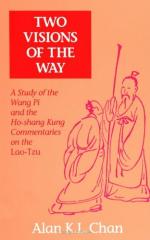|
This section contains 1,092 words (approx. 4 pages at 300 words per page) |

|
Third-century Chinese philosopher Wang Bi (226–249 CE) achieved fame as an interpreter of the Laozi and the Yijing (Classic of changes), whose radical reformulation of the concept of Dao as nonbeing (wu) helped spark a new current of thought called Xuanxue (Learning of the mysterious), sometimes translated as "neo-Daoism." To Wang, Confucius, Laozi, and the other sages of old had discerned the true meaning of Dao as the root of all beings. This was misunderstood, which necessitated a reinterpretation of the classical heritage.
Wang probed the basis of interpretation and argued that words do not fully express meaning. This was a major debate in early medieval Chinese philosophy. Against earlier commentators who reduced meaning to reference, Wang believed that words are necessary but insufficient for understanding and sought to uncover the fundamental ideas that unite the classics. Famously, Wang declared that words must...
|
This section contains 1,092 words (approx. 4 pages at 300 words per page) |

|


